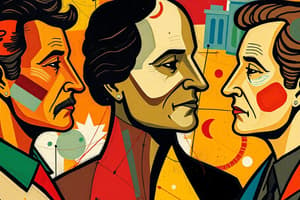Podcast
Questions and Answers
What is the primary focus of comparative politics?
What is the primary focus of comparative politics?
- Study of political philosophies and ideologies
- Examination of global economic interconnections
- Influence of interest groups in policy-making
- Analysis of different political systems and their functions (correct)
Which type of authority derives legitimacy from established beliefs and traditions?
Which type of authority derives legitimacy from established beliefs and traditions?
- Charismatic authority
- Traditional authority (correct)
- Legal-rational authority
- Executive authority
What is characterized by government by the people, free elections, and protection of civil liberties?
What is characterized by government by the people, free elections, and protection of civil liberties?
- Authoritarianism
- Monarchy
- Democracy (correct)
- Totalitarianism
Which of the following is an example of political behavior?
Which of the following is an example of political behavior?
How can human rights be defined in the context of political science?
How can human rights be defined in the context of political science?
What method involves statistical analysis to derive trends and patterns?
What method involves statistical analysis to derive trends and patterns?
What type of political system seeks to control all aspects of life?
What type of political system seeks to control all aspects of life?
What is the term for the ability of a state to govern itself without external interference?
What is the term for the ability of a state to govern itself without external interference?
Flashcards are hidden until you start studying
Study Notes
Overview of Political Science
- Definition: Study of political institutions, processes, behavior, and power dynamics in societies.
- Subfields:
- Comparative Politics: Analysis of different political systems and their functions.
- International Relations: Examination of relationships between countries and global issues.
- Political Theory: Exploration of political ideas, philosophies, and ideologies.
- Public Administration: Focus on government policies, management, and public sector.
Key Concepts
- Power: The ability to influence or control outcomes and people.
- Authority: Legitimacy to exercise power; different types include traditional, legal-rational, and charismatic.
- State: A political unit with defined territorial boundaries, a permanent population, and a government.
- Sovereignty: The authority of a state to govern itself and make decisions free from external interference.
Political Systems
- Democracy: Government by the people, characterized by free elections and civil liberties.
- Authoritarianism: Concentration of power in a single leader or party, limited political freedoms.
- Totalitarianism: An extreme form of authoritarianism that seeks to control all aspects of life.
- Monarchy: Rule by a king or queen, which can be absolute or constitutional.
Political Behavior
- Voting: Process by which citizens elect representatives; influenced by demographics, ideologies, and party affiliation.
- Political Parties: Organizations that represent specific ideologies and seek to control government.
- Interest Groups: Organizations that advocate for specific issues or policies, seeking to influence political decision-making.
Global Issues in Political Science
- Globalization: Increasing interconnectedness of world economies and cultures.
- Conflict and War: Study of the causes, processes, and impacts of international and civil conflicts.
- Human Rights: Examination of the protection and promotion of fundamental rights globally.
Research Methods
- Qualitative Methods: In-depth analysis through interviews, case studies, and participant observation.
- Quantitative Methods: Statistical analysis using data sets, surveys, and experiments to derive trends and patterns.
- Comparative Method: Evaluating different political systems and cultural influences to understand outcomes.
Important Theorists
- Niccolò Machiavelli: Considered the father of modern political science; emphasized realism and the importance of power.
- John Locke: Advocated for natural rights and social contracts; foundational to liberal democracy.
- Karl Marx: Critiqued capitalism and introduced ideas about class struggle and economic systems.
- Max Weber: Known for his theories on bureaucracy, authority, and rationalization in politics.
Overview of Political Science
- The study of political institutions, processes, behavior, and power dynamics in societies.
- Multiple Subfields:
Comparative Politics
- Examines different political systems and their functions.
International Relations
- Focuses on relationships between nations and global issues.
Political Theory
- Explores political ideas, philosophies, and ideologies.
Public Administration
- Studies government policies, management, and the public sector.
Key Concepts
- Power: The ability to influence or control outcomes and people.
- Authority: Legitimate power; different types include traditional (based on custom), legal-rational (based on law), and charismatic (based on personality).
- State: A political unit with defined borders, a permanent population, and a government.
- Sovereignty: The authority of a state to govern itself and make independent decisions.
Political Systems
- Democracy: Government by the people, characterized by free elections and citizen rights.
- Authoritarianism: Concentration of power in a single leader or party, with limited individual freedoms.
- Totalitarianism: An extreme form of authoritarianism seeking control over all aspects of life.
- Monarchy: Rule by a king or queen; can be absolute or constitutional.
Political Behavior
- Voting: Citizens electing representatives, influenced by demographics, ideologies, and party affiliation.
- Political Parties: Organizations representing specific ideologies, aiming to control government.
- Interest Groups: Organizations advocating for specific issues or policies, trying to influence political decisions.
Global Issues in Political Science
- Globalization: Increasing interconnectedness of world economies and cultures.
- Conflict and War: Studying causes, processes, and impacts of international and civil conflicts.
- Human Rights: Examining the protection and promotion of fundamental rights globally.
Research Methods
- Qualitative Methods: In-depth analysis through interviews, case studies, and observation.
- Quantitative Methods: Statistical analysis using data sets, surveys, and experiments to identify trends and patterns.
- Comparative Method: Evaluating different political systems and cultural influences to understand outcomes.
Important Theorists
- Niccolò Machiavelli: Considered the father of modern political science, emphasized realism and the importance of power.
- John Locke: Advocated for natural rights and social contracts, foundational to liberal democracy.
- Karl Marx: Critiqued capitalism and introduced ideas about class struggle and economic systems.
- Max Weber: Known for his theories on bureaucracy, authority, and the rationalization of politics.
Studying That Suits You
Use AI to generate personalized quizzes and flashcards to suit your learning preferences.




